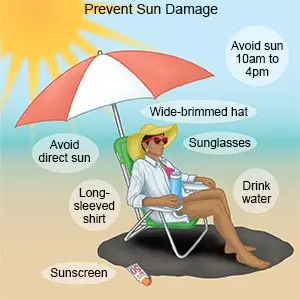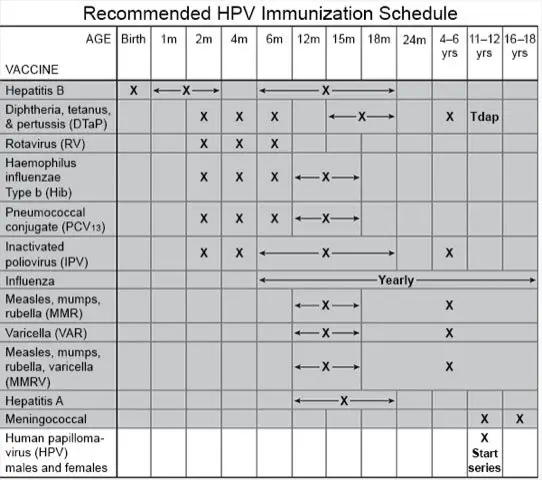What is squamous cell carcinoma (SCC)?
SCC is a slow growing cancer that usually does not spread. Squamous cells are found in the skin, organs, respiratory tract, and digestive tract. SCC can develop in any of these areas, but it is most common in skin areas that get a lot of sun.
What increases my risk for SCC?
- Age 60 years or older
- Fair skin or light hair
- A history of long-term exposure to the sun or ultraviolet (UVA or UVB) rays from tanning beds
- Exposure to chemicals such as coal tars, arsenic, or radium
- A history of other skin disorders, such as actinic keratosis, radiation dermatitis, or burn scars
- Cigarette or alcohol use
- A human papillomavirus (HPV) infection
What are the signs and symptoms of SCC?
You may have the following, depending on where the SCC develops:
- A sore on the skin that does not heal
- A small, red, or scaly bump that crusts over
- An area of skin that itches, bleeds easily, or is painful
- Sore throat or hoarse voice
- Pain when you swallow
 |
How is SCC diagnosed?
Your healthcare provider will examine you and ask about your symptoms. Tell your provider if you have a family history of cancer. You may also need any of the following, depending on the area affected:
- Tissue staining is a procedure to see if tissue looks normal or abnormal. Dye is placed on the lesions in your mouth to check the reaction.
- CT or MRI pictures may show nodules, masses, or tissue thickening. You may be given contrast liquid to help the mouth cancer show up better in the pictures. Tell the healthcare provider if you have ever had an allergic reaction to contrast liquid. Do not enter the MRI room with anything metal. Metal can cause serious injury. Tell the healthcare provider if you have any metal in or on your body.
- A biopsy (sample of mouth tissue) may be checked for cancer.
- An endoscopy is a procedure used to look directly at the tissues of your mouth, throat, and upper airway. An endoscope is a flexible tube with a light and camera on the end.

- An HPV test may be used to check for certain types of HPV linked to SCC. A vinegar liquid is used to help find if genital warts were caused by HPV. The test can be done with or without a Pap smear. A Pap smear checks for cancer or for abnormal cells that can become cancer.
- Biomarker testing is a blood test that may be used to check for certain cancer proteins or substances. This helps your provider recommend some treatments, such as immune checkpoint inhibitors. Biomarker testing may be recommended if you have SCC that comes back after treatment or that metastasizes (spreads).
How is SCC treated?
Treatment depends on where the SCC is located:
- Cryosurgery is a procedure that uses a chemical, called liquid nitrogen, to freeze and kill a small area of tissue. The tissue dies and later falls off.
- Mohs surgery is used to remove only skin with cancer cells and as little healthy tissue as possible. Thin layers of the tumor are scraped off one at a time until all the cancer cells are removed.
- Surgery is used to remove the cancer.
- Electrodesiccation and curettage is used for skin SCC. The tumor is scraped and then heated with an electric probe to kill the cancer cells.
- Laser therapy uses a narrow beam of light to kill the cancer cells.
- Topical chemotherapy is given as a lotion or cream to put directly on skin cancer to kill cancer cells.
- Radiation uses x-rays or gamma rays to treat cancer. Radiation kills cancer cells and may stop the cancer from spreading. It may be used for hard-to-treat areas, such as the eyelids, tongue, or esophagus.
- Immune checkpoint inhibitor medicines may help your immune system kill the cancer or keep it from progressing as quickly.
Treatment options
The following list of medications are in some way related to or used in the treatment of this condition.
- Erbitux
- Keytruda
- cetuximab
- Libtayo
- pembrolizumab
View more treatment options
What can I do to manage or prevent SCC?
- Protect your skin from sun damage:
- Wear sunscreen when outdoors. Use sunscreen with an SPF (sun protectant factor) of at least 15 and UVA and UVB protection. Reapply after you swim or sweat. If you need to be in the sun, wear a hat and long-sleeved shirts and pants to cover your skin.
- Stay out of the sun between 10 am and 4 pm. This is when the sun is the strongest and most damaging to your skin.
- Do not use tanning booths. These can damage your skin as much as the sun.
- Check your skin monthly. Watch for growths or moles that change size, shape, or color.

- Do not use tobacco products or drink alcohol. These increase your risk for SCC of the mouth and throat and can make your symptoms worse. Ask your healthcare provider for information if you currently use tobacco products or alcohol and need help to quit. E-cigarettes or smokeless tobacco still contain nicotine. Talk to your healthcare provider before you use these products.
- Prevent an HPV infection. Some types of HPV can cause or increase your risk for certain cancers, especially SCC. HPV is usually spread through sexual activity. The HPV vaccine is given to females and males, usually at 11 or 12 years of age. It can be given from 9 years through 45 years of age, if needed. It is most effective if given before sexual activity begins. Use a new condom, contraceptive barrier, or dental dam each time you have sex. This includes oral, vaginal, and anal sex.

- Eat healthy foods. Healthy foods include fruits, vegetables, whole-grain breads, low-fat dairy products, beans, lean meats, and fish. Take small bites, and chew your food well before you swallow. Be especially careful when you eat meat, fruits, and vegetables. A dietitian may help to plan the best meals and snacks for you.

- Exercise as directed. Exercise may help increase your energy level and appetite. Ask your healthcare provider how much exercise you need and which exercises are best for you.

Where can I find support and more information?
- American Cancer Society
250 Williams Street
Atlanta , GA 30303
Phone: 1- 800 - 227-2345
Web Address: http://www.cancer.org
Call your local emergency number (911 in the US) if:
- You have chest pain.
- You have shortness of breath.
When should I seek immediate care?
- You have trouble thinking clearly.
When should I call my doctor?
- You have a new growth or a mole that changes size, shape, or color.
- You have a fever.
- You have chills, a cough, or feel weak and achy.
- You have questions or concerns about your condition or care.
Care Agreement
You have the right to help plan your care. Learn about your health condition and how it may be treated. Discuss treatment options with your healthcare providers to decide what care you want to receive. You always have the right to refuse treatment. The above information is an educational aid only. It is not intended as medical advice for individual conditions or treatments. Talk to your doctor, nurse or pharmacist before following any medical regimen to see if it is safe and effective for you.© Copyright Merative 2023 Information is for End User's use only and may not be sold, redistributed or otherwise used for commercial purposes.




